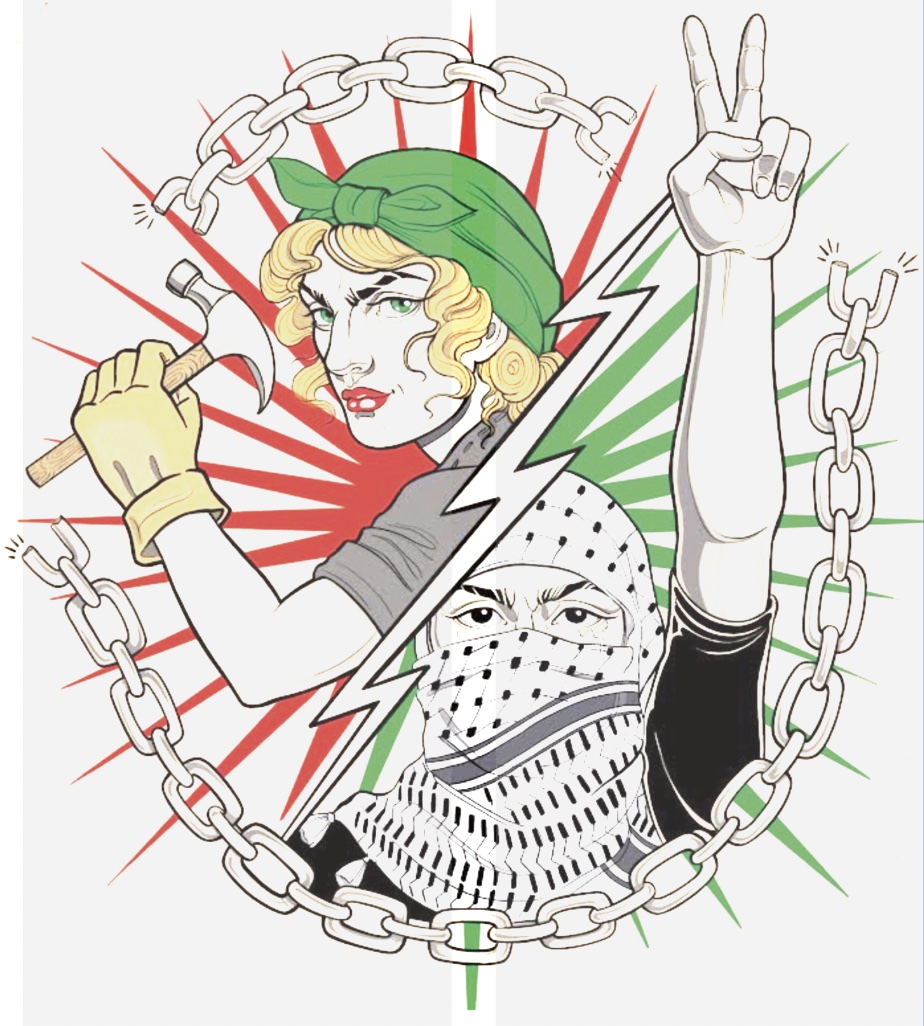By Martin Ralph
On 28th November 2024, trade unionists and activists across the UK organised a National Workplace Day of Action for Palestine, called by the Palestine Solidarity Campaign and Stop the War Coalition, with official backing from the TUC, Unison, UCU, NEU, RMT, PCS, IWGB, UVW, and other unions. Action included protests, lunchtime meetings, and rallies at workplaces and universities, calling for an immediate ceasefire in Palestine.
Student groups and union speakers raised additional demands, such as the Boycott, Divestment, and Sanctions (BDS) campaign, calling for a boycott of companies complicit in Israel’s actions, like Barclays, and for divestment from firms supporting the occupation and genocide of Palestine. Across the day slogans were chanted – “Free Free Palestine, from the River to the Sea”.
An important protest took place at the School of Oriental and African Studies (SOAS) in London, with 200 students and staff gathering in response to the university’s attacks on student activist rights. SOAS had suspended three students for their pro-Palestinian activism — Abel, Haya, and Tara (Abel was co-president of the student union, now dismissed). The university also obtained a court injunction barring activists from entering the campus with banners, effectively criminalising protest.
Rallies and other actions took place at universities across the country with campus unions UCU, Unison and Unite members, as well as students.
The NHS was also a focus of the day, particularly relating to privatised services like Palantir (large US software company with links to Israeli military). Union members highlighted the firm’s controversial NHS contract, the CEO’s stance against the NHS and the company’s role supporting Israeli military actions in Palestine.
The day of action was supported by ongoing strikes – Whitehall G4S security guards on strike posed with Palestine leaflets. Islington Sixth Form College saw UCU and NEU union members raise banners chanting “Education, not bombs”.
Solidarity actions also took place in local councils with Unison members organising lunchtime protests in Leicester, Camden, Hammersmith and Fulham, and Salford. In Portsmouth, activists launched a campaign to divest from companies supporting the illegal occupation of Palestine, focusing on the Hampshire Pension Fund, which invests in such companies.
University of Liverpool
A rally and teach-in was organised by UCU, the Students of Alareer Square and local union branches; Unison, FBU (Fire Brigades Union), RCN (Royal College of Nursing), and Liverpool TUC expressed support. Fifty people attended HE with speeches about the Zionist attack on education in Palestine – according to the UN 93% of Gaza’s 560 schools have been destroyed or damaged since 7 October 2023, with 340 schools directly targeted by the Israeli army. Educational institutions have been systematically targeted with teachers and students killed.
Palestinian educational spaces have always been vital hubs for learning, revolutionary activism, cultural preservation, and maintaining relationships between Palestinian communities separated by Israeli colonisation since the 1948 Nakba.
Israa University, south of Gaza City, was demolished in January, Israel occupied the campus for months, using it as a military base and detention centre before destroying it. Israeli forces are turning universities into battlegrounds, effectively committing “scholasticide”. Palestinians have one of the highest literacy rates in the world, and in Palestine, education is seen as a form of resistance — one reason why Israel is destroying it. Yet, the resistance continues.
Barclays is bankrolling Israel’s genocidal assault on Palestinians, as outlined in motions passed by the UCU and Liverpool TUC. Further action is planned. We need to build broad alliances, such as with climate change activists, to sever links with Barclays, which invests heavily in fossil fuel development.
Liverpool University is complicit in arms research and uses Barclays for its financial and investment needs.
Spain
It is also important to consider the actions of other countries. The report of the day of action by Corrente Roja (www.corrienteroja.net/) in Spain on 27 September showed a broader range of industries and sectors including companies, educational institutions, hospitals, and working-class neighbourhoods. This was a significant mobilisation for the working class, leading to major afternoon demonstrations.
While actions in the UK were primarily confined to workplace settings, Spain’s actions saw greater neighbourhood mobilisations. The Spanish action marked a significant step forward in support of the pro-Palestinian resistance, with calls for the Spanish government to break all military, commercial, and diplomatic ties with the Zionist state. UK unions, neighbourhoods, and student groups must adopt a similar united stance, demanding that Starmer’s government take action in line with popular sentiment.
We need to build a working-class movement that is self-organised, class-independent, non-sectarian, and democratic, as the Spanish working class is doing, as reported by the Co.Bas (www.cobas.es/) union.
Growing Unity in Struggle for Palestine
The Workplace Day of Action demonstrated the growing integration of Palestinian solidarity within UK trade unions and workplaces. It showed that much greater solidarity with Palestine can be built within the trade union movement.
While ongoing actions, such as local demonstrations, billboarding, actions and protests outside arms factories and Labour conferences, help to build a broad base. The focus must now be on engaging the rank and file of all unions, alongside combative union leaderships, neighbourhoods, and student movements. Workers in Britain, as in Europe and the USA, must aim to hold our governments to account. The central task of all these activities is to mobilise the working class, as it is the only force capable of demandings governments, “Stop the genocide, or we will stop the country!”


